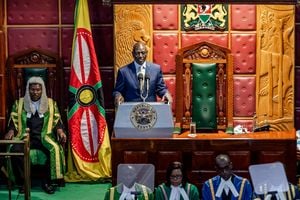World Cancer Day should be the day of reckoning, where Kenya goes beyond free screening

Residents march to mark World Cancer Day in Eldoret town, Uasin Gishu County on February 04, 2022.
As we recognise and celebrate World Cancer Day, a few uncontested facts should be reviewed.
First, cancer is among the four leading causes of death in Kenya. Secondly, 23 percent of patients do not seek care due to systemic and attitudinal barriers, which include the high cost of treatment, long travel distances to access relevant healthcare facilities, and, in some instances, inadequate information regarding healthcare.
Thirdly, the World Bank data of 2021 on health indicate that almost one million Kenyans have become poorer, falling below the poverty line owing to health-related expenditures. Fourthly, there is no designated budget; therefore, cancer prevention and control efforts fall within and among the general allocations without a mandatory base minimum.
This country must unite to promote the right to life as espoused in Article 26 of the Constitution. It should not matter a patient’s gender, age, race, religious orientation, or station of life to be guaranteed their right to quality health and healthcare services. Patients, as consumers of healthcare services and in resonation with Article 46 of the Constitution, must be accorded the space and service, besides providing room to pursue what is short yet rightfully theirs.
The gesture by the government or President to waive the hospital bill of the late Catherine Kasavuli, a renowned news anchor in Kenya, depicts a country whose inequality is significantly despicable. Many Kenyans, most of poor backgrounds, struggle to place a meal on the table, let alone worry about hospital bills. There are many more whose children cannot afford uniforms to get to a school, despite the captivating beauty purported to exist within Competency-Based Learning.
The hard-pressed, cash-strapped poor in the country is torn between feeding and the presence of ill health, with no room for recourse. A visit to a hospital is fast becoming a luxury that is avoided at all costs. Those unable to afford health and medical care have had to part with sometimes meagre family assets to facilitate treatment for their loved ones. This state of affairs must be confronted with the infrastructural agility and policy commitment to promote the right to healthcare as espoused in Article 43 of the Constitution.
Among those who succumb to cancer, 60 percent are in their most productive lives. Almost every household with a cancer patient risks destabilising its economic base. Owing to the ailment, the right to access death is unlimited and respects no prominence nor reasons with non-prominence. However, the right to life, espoused in Article 26 of the Constitution, is not as apparent since economic boundaries continue to separate the poor and the wealthy.
The government allocated Sh62.3 billion to cater for universal health coverage and affordable healthcare for all Kenyans for the financial year 2022/2023. How ordinary Kenyans caring for cancer patients relate to these figures could be a story that, on the minimum, be described by the number of unpaid bills, reduced visits to healthcare facilities, and deaths.
For the country to defeat cancer, certain basics must be improved. The county governments must be facilitated to ensure that rural-based patients do not suffer discrimination since most of the relevant healthcare facilities are urban-centred, yet health as a service and programme has devolved. The government must review its programming, budgeting, and financing to realise a national healthcare budget of 15 percent of the 100 percent allocation as espoused and committed to within the Abuja Declaration. This should be done because statistics show 9.5 percent to be the highest the country ever reached in 2013-2017.
Also read: Moving beyond policy to curb breast cancer
Accountability and commitment to serve the people must be a threshold of healthcare governance so that the governments can be taken to account for poor services, inadequate personnel, and poorly distributed resources and facilities. Cancer treatment must be subsidised and made available in its most rudimentary form and in remote places. Cancer registries to improve data and feedback amongst at-risk and ailing must be spread all over the country in a manner responsive to disease proliferation.
It should be recalled that in Kenya, fifty-four years after independence and a decade into devolution government, the geographic, resource, and professional disparities continue to prevail, with the northern frontier suffering the most. Similarly, political patronage persists, and clientelism is entrenched in the government-led service industry, notwithstanding allegations of corruption. However, this is not to say that successive governments haven’t initiated interventions. The National Hospital Insurance Fund (NHIF) faces intermittent victimisation for political scores, even though it holds an improved oncology package. In addition, the National Cancer Institute is in place but grossly underfunded.
World Cancer Day (marked on February 4) must be the turning point where the government is reminded of the challenges faced and experienced by poor Kenyans in the healthcare system, part of which manifests as unpaid bills in our most referral hospitals, such as Kenyatta National Hospital owed Kenya shillings 5.4 billion.
February 4, 2023 should be the day of reckoning, where the country turns beyond free cancer screening. It must become the day we commit an affirmative budget and programme to cancer to reduce the untold suffering from patients and their caregivers with no access to media and public communication platforms. This day must emulate the decision in the case of Emmah Muthoni Njeri vs. Nairobi Women’s Hospital, where the High Court of Kenya clarified why it was unconstitutional and inhumane to detain patients for failing to pay their hospital bills. The judgment was clear that such acts offended Article 28, which speaks to the dignity of a person, 29 which addresses physical safety, and 39 on freedom of movement and residence.
With remorse, let the country wake up all its healthcare activists, human rights defenders, and Kenyans of all walks of life to advocate for leadership and a political economy that designs Universal Health Coverage to scale down and eradicate deaths and disabilities that accrue from cancer. It is an opportunity to realise our commitment to Sustainable Goal Number 3 and stay true to the principle of leaving no one behind.
Eric Mukoya is the Executive Director at Undugu Society of Kenya.
***
Do you have feedback on this article? Please e-mail: [email protected]





